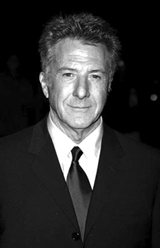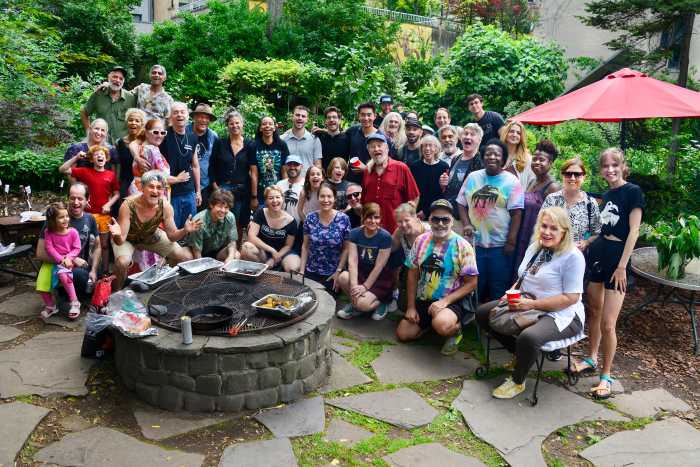By Jerry Tallmer
From Benjamin Braddock to Ratso Rizzo to Lenny Bruce to Carl Bernstein to Ted Kramer to Raymond Babbitt the Rain Man to Captain Hook to Bernie Focker, there were dozens and dozens of Dustin Hoffmans firing the imaginations of 2,700 people in Avery Fisher Hall on Monday evening, April 18, but no character or moment more harrowing than Dustin Hoffman as Willy Loman when that goddamn tape recorder goes off on the desk of Howard, the young punk who, for all Willy’s years with the firm — Howard’s late father’s firm — is now throwing Willy away like an orange peel, a used-up piece of fruit.
And that heart-stopping moment is in fact on television tape, rather than the 50 or so distinctive, individual human beings on motion-picture stock into whom Dustin Hoffman has poured the human and the being since Benjamin Braddock in “The Graduate” of 1967.
To all of us watching over all these years, said Ira Resnick, chairman of the board of the Film Society of Lincoln Center, introducing Monday’s gala tribute to that actor, Dustin Hoffman in a “new golden age of Hollywood” personifies “the anti-hero … the underdog we root for, the misfit we applaud.”
In short order, at the start of an ongoing mélange of film clips masterfully chosen and assembled by Wendy Keys – “a young woman who held my hand for three weeks,” Hoffman said later – 2,700 people had immediate reason for new and old applause and laughter as anti-hero misfit Benjamin Braddock, fresh out of college, clears his throat while he works himself up to planting a kiss on Mrs. Robinson.
“Wood or wire?” Benjamin asks, fumbling amongst the hangers in the hotel-room closet as the lady — “one of the most attractive of all my parents’ friends” — starts to take her clothes off. When the young man says he doesn’t know what to do next, she coolly suggests: “Why don’t you watch?”
A small chronological point, stressed a few minutes later by Mike Nichols, who 38 years ago had plucked from an obscure New York stage “this Off-Broadway actor playing a Russian transvestite fishwife in a kimono” and flown him out to Hollywood: “Anne Bancroft was 34. Dustin was 31. That’s called acting …
“Dustin Hoffman,” said Nichols, “is one of the very few movie actors who has a deal with Technicolor. Whatever they put in the [chemical] bath, he gets better … He not only has a deal with Technicolor, he has a deal with audiences. We feel very close to Dustin whatever he does.”
Next on the stage at Avery Fisher, immediately following a “Kramer vs. Kramer” clip of the knock-down-drag-out dinner-table and ice-cream battle royal between Ted Kramer and young son Billy, ending with Billy and his father asleep head-to-head, was Justin Henry, the actor who had played the kid.
“It was 26 years ago we did that movie,” grown-up Justin Henry said. “I actually now have a family of my own, blown-out knees, the whole bit …
“Talent is only part of it,” said Henry. “What Dustin does is create an environment for the rest of us to work in. He helped me to learn to be an actor. To trust myself. To open up — because Dustin opened up to me. It takes a very special sort of actor to let go.” And that’s where Justin Henry let it go — short, sweet, to the point.
Which point was reinforced by Kevin Bacon, who recalled walking into a dollar movie house, in Philadelphia, at age 13, “looking to see some titties,” and instead staring at a horrible creep named Ratso Rizzo in something called “Midnight Cowboy” and wondering “how they ever got this bum to come in and learn lines?”
Next thing Bacon knew, he was at a flick called “The Graduate” – “and I realized this guy’s an actor, that’s what an actor does! … The way Dustin always uses himself, and at the same time loses himself, in a part … It changed my life.”
Clips, clips, clips. “Little Big Man,” “All the President’s Men,” “Tootsie,” “Ishtar.” Hey, “Ishtar”! Dustin and Warren Beatty and that camel out there in that desert. A historic flop in 1987. Now looks kind of crazy. Might be ripe for a shrewd revival.
Jennifer Beals, who appeared with John Cusack, Gene Hackman, and Dustin Hoffman in “Runaway Jury” (2003), will never forget – she told the assemblage at Avery Fisher – how after two days of nonstop “surreal, repetitive, hour after hour” movie-making against frightful acoustics in a huge West Coast warehouse, “it became clear to Dustin that a young actor” [whom she did not name] “was better than he seemed.”
“Slowly Dustin starts changing all his own lines to create something fresh, so that the young actor doesn’t know what’s coming next. Dustin keeps improvising, like a dolphin playing in the water. Line for line, the young actor starts listening, and as he comes alive Dustin throws his fist in the air and says: ‘Now that’s acting!’
“We’re all crying. Dustin saw the beauty in that young actor, and determined to bring it out.”
There is Dustin the actor and also Dustin the clown. A clip of Hoffman and Lily Tomlin in “I (Love) Huckabees” was followed by that 2004 film’s director David O. Russell telling how Ms. Tomlin “expected to find herself on the set with this intense master of The Method, and instead found Shecky Greene or Groucho Marx.
Robert De Niro talks aplenty on film, but off film, in person, especially at public functions, he is famously almost without any words at all.
Now De Niro popped out from the wings to say, tongue barely in cheek, how when he, Robert De Niro (born August 17, 1943) was “very young,” he and his mother would line up to see one or another movie starring Dustin Hoffman (born August 8, 1937). “A terrific person, a good man, a little older than I am,” needled De Niro, with a thumbs-up salute in the direction of the guest of honor.
Who forthwith emerged from the opposite wing, and after a two-minute standing ovation had sat back down, dryly and amiably began with: “I think we made history tonight. Robert De Niro speaks! You can’t be more honored than that.”
In what he termed an “aesthetic striptease,” Hoffman told of being “born into what is now known as a dysfunctional family – I found that out three weeks ago – there are not many functional families.”
He was, he said, flunking out of college – “junior college” – when a friend informed him: “Nobody flunks acting, it’s like gym.”
So that’s how dysfunctional Dustin metamorphosed into Dustin the functional, professional actor – “something I still don’t know what it is.”
He quoted from from E.E. Cummings (“ … balancing three chairs on a ladder eight feet in the air, without any net”), he quoted from Rilke (“works of art are an infinite loneliness”).
He talked of failure. “Every scene from the films you have seen tonight,” he said. “All of them, every one, began as failures, and then suddenly started to take form.”
He talked worshipfully of “the process” and of sharing — the mystery of sharing. “All in this room tonight,” Dustin Hoffman said as he looked out into the great hall, “are sharing in the mysteries of what we are.” Yes, I suppose we were. But only one of us – just one, out of the whole 2,700 – was Dustin Hoffman.




































